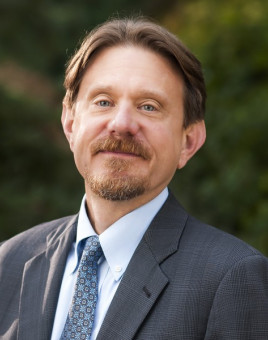
Scott Fletcher was appointed dean of the Graduate School of Education and Counseling at Lewis & Clark on August 1, 2008. He arrived here from the University of New Hampshire, where he served on the faculty for 12 years, chairing their education department from 2004 to 2008.
Scott earned his BA in philosophy from Ripon College in 1981, his MA in social and political philosophy from the University of Wisconsin at Madison in 1985, and his PhD in the social foundations of education from the University of Colorado at Boulder in 1997. His scholarly work addresses a wide range of issues in the philosophy of education, curriculum theory, teacher preparation, and environmental education. His first book, Education and Emancipation: Theory and Practice in a New Constellation, won the American Educational Studies Association’s Critic’s Choice Award in 2001. Scott is the executive editor of the open-access journal Democracy & Education, published at Lewis & Clark. In addition to his academic appointments, Scott has been actively involved in educational policy and school reform initiatives at the local, state, and national level. He has worked with the Coalition of Essential Schools and the Annenberg Institute for School Reform, and he cofounded the Michigan CES center.
Dr. Fletcher’s career reflects a belief that education should seek connections among the many disciplines of study. He says:
Distinctions between the disciplines do not arise naturally or separately from the world of human experience; instead, they are ways of understanding that have emerged historically and continue to evolve in relation to the particular challenges and problems we face. Authentic learning engages us at the deepest level, where our experience demands that we find the answer to a burning question, where we challenge a belief to make it stronger or cast it aside in search of deeper understanding. This is the foundation for an approach to teaching and learning that is both experiential and rooted in inquiry. Our growth as individuals and members of society demands that we engage in sustained critical reflection, thinking deeply about who we are, where we come from, what we value, and what we want to accomplish. The potential benefit of such reflection grows exponentially when we undertake it in collaboration with others. Such an education recognizes our interdependence and calls on us to build relationships based on mutual respect and a willingness to explore differences. Learning communities should facilitate these relationships in everything from the environment of the classroom to the content of the curriculum. Finally, and perhaps most fundamentally, I believe that education in a democracy should reflect a concern for social justice in the broader society. I advocate and try to practice an approach to teaching that helps students build their capacity for critical judgment through the decisions they make and the projects they pursue. It is not easy to teach or to learn in this way, but it is where my hope for the future rests.
He is married to Liza Finkel and has a son, Galen.
Personal Statement
Our growth as individuals and members of society demands that we engage in sustained critical reflection, thinking deeply about who we are, where we come from, what we value, and what we want to accomplish. The potential benefit of such reflection grows exponentially when we undertake it in collaboration with others. Learning communities should facilitate these relationships in everything from the environment of the classroom to the content of the curriculum.
Areas of Expertise
Philosophy of Education, Curriculum Theory, Teacher Preparation, and Environmental Education
Publications
Books
- Fletcher, S. (Ed.). (2003). Philosophy of Education 2002. Urbana, IL: The Philosophy of Education Society/University of Illinois at Urbana at Champaign.
- Fletcher, S. (2000). Education and Emancipation: Theory and Practice in a New Constellation. New York: Teachers College Press.
Articles/book chapters
- Fletcher, S. and Nelsen, P. (2014). Democratic Theory of Education. In Philips, D. C. (ed.), Encyclopedia of Educational Theory and Philosophy. Thousand Oaks, CA: Sage Publications.
- Fletcher, S. and Nelsen, P. (2011). Democracy in a cosmopolitan age: Moral education for the global citizen. In DeVitis and Yu (eds.), Character and moral education: A reader. New York: Peter Lang.
- Fletcher, S. (2008). Tempting Fate: A Review of Gene Glass’s Fertilizers, Pills, and Magnetic Strips: The Fate of Public Education in America. Encounter: Education for Meaning and Social Justice 21(4):46-49.
- DeMitchell, T.A. and Fletcher, S. (2008). Do Not Resuscitate Orders in Schools: A Conundrum of Duty, Ethics, and Policy. West’s Education Law Reporter 235(1):11-25.
- Fletcher, S. (2005). Deliberative Democracy and Moral Development. In S. Fletcher (Ed.), Philosophy of Education 2005. Urbana, IL: The Philosophy of Education Society/University of Illinois at Urbana at Champaign.
Academic Credentials
PhD 1997 University of Colorado at Boulder, MA 1985 University of Wisconsin at Madison, BA 1981 Ripon College
Location: Rogers Hall
Teaching is located in room 402 of Rogers Hall on the Graduate Campus.
MSC: 14
email lcteach@lclark.edu
voice 503-768-6104
fax 503-768-6115
Department
Teaching, School Counseling, and Leadership Studies
Chair
Mollie Galloway
Elementary Program Director
Linda Griffin
Secondary Program Director
Liza Finkel
Administrative Specialist
Shanta Calem
Teaching
Lewis & Clark
615 S. Palatine Hill Road MSC 14
Portland OR 97219